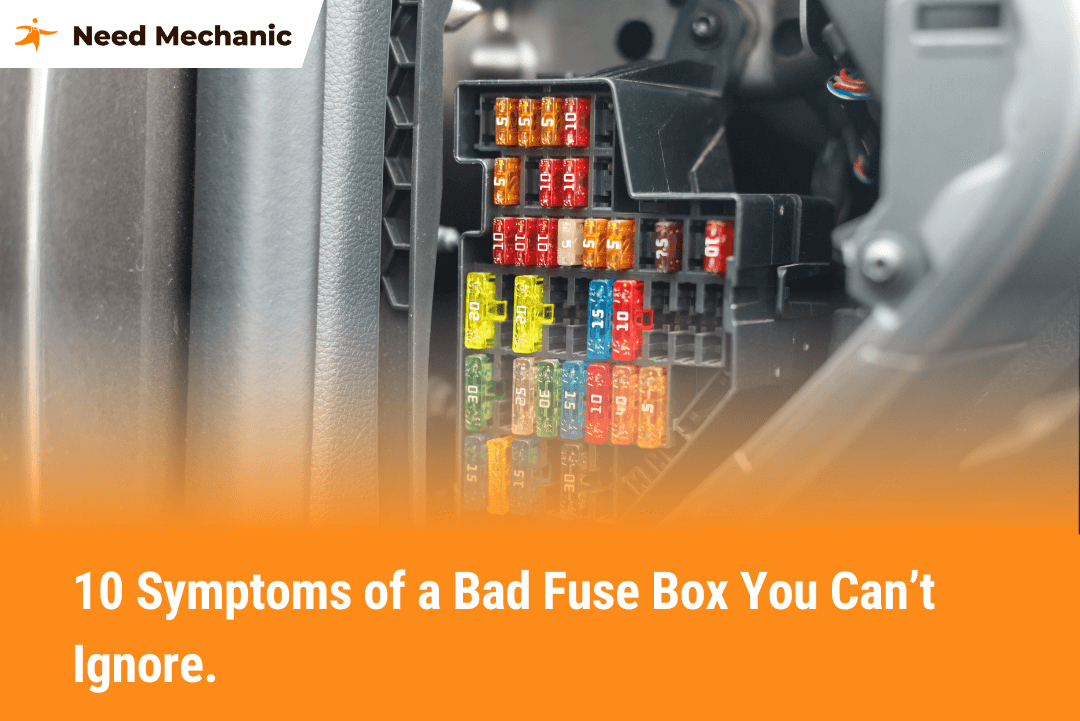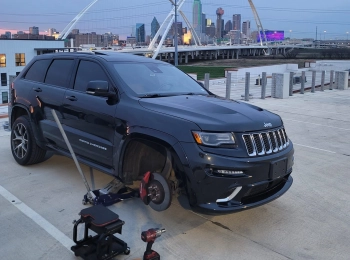Symptoms of a bad fuse box include flickering or dim headlights, several electrical parts in the car not working at the same time, frequent blown fuses, strange burning smells, dashboard warning lights turning on for no reason, and sometimes the car not starting at all. A fuse box is the main hub that distributes power to all electrical systems in your vehicle, and when it’s damaged, corroded, or worn out, it can cause multiple problems at once. Recognizing these signs early can save you from expensive repairs and keep you safe on the road.
Why This Matters to Every Driver
Your car’s fuse box works quietly in the background, sending electricity to everything from your headlights to your radio. But when it starts to fail, you’ll quickly realize how much depends on it. Ignoring bad fuse box symptoms can lead to frustrating breakdowns, safety hazards, and high repair bills.
This guide is designed for new and experienced drivers alike, using simple, clear explanations so you can easily identify and understand the signs. Each section will not only explain the symptom but also why it happens and how you can fix it.
1. Several Electrical Parts Fail at the Same Time
One of the clearest signs of a bad fuse box is when multiple systems stop working together – for example, your radio, interior lights, and power windows all quit.
- Why it happens: A failing fuse box can’t properly send power to the circuits connected to those systems.
- How to fix it: Check the related fuses. If they are blown or the slots look burnt, the fuse box may have internal damage and need replacement.
2. Flickering or Dim Headlights
If your headlights keep flickering or seem dim even after you replace the bulbs, it could be a fuse box issue.
- Why it happens: Damaged or corroded fuse box connections cause unstable voltage, making lights act up.
- How to fix it: Check the headlight fuses for damage. If the fuses look fine but the problem continues, have a mechanic inspect the fuse box for corrosion or loose connections.
3. Car Won’t Start or Starts Intermittently
A bad fuse box can cause the ignition system to lose power. Sometimes the car won’t start at all, other times it starts only after several tries.
- Why it happens: The starter relay relies on a steady power supply, which a failing fuse box can interrupt.
- How to fix it: Test the ignition-related fuses. If they blow often or appear burnt, the fuse box likely has an internal fault.
4. Burning Smell from Dashboard or Fuse Box Area
A burning plastic or electrical smell should always be taken seriously.
- Why it happens: Overheated wires, loose connections, or melting plastic inside the fuse box can produce this odor.
- How to fix it: Stop driving immediately and disconnect the battery. Driving further could risk an electrical fire. The fuse box will probably need replacing.
5. Frequent Blown Fuses
Occasional blown fuses are normal, but replacing them constantly is a red flag.
- Why it happens: Internal faults in the fuse box can send too much current through circuits, causing repeated fuse failures.
- How to fix it: Replace fuses with the correct amperage. If they keep blowing, the issue is deeper inside the fuse box.
6. Dashboard Warning Lights Acting Strangely
If your check engine, ABS, or airbag lights flash on and off without cause, the problem may not be the system itself but the fuse box.
- Why it happens: Electrical interference or unstable power supply from a faulty fuse box can trigger false warning signals.
- How to fix it: Use an OBD-II scanner to check for codes. If multiple unrelated systems are showing errors, the fuse box should be inspected.
7. Clicking or Buzzing Noises from the Fuse Box
Hearing unusual sounds from the dashboard or fuse box area is not normal.
- Why it happens: Loose wires or failing relays inside the fuse box can cause clicking or buzzing as they try to operate.
- How to fix it: Check for moisture, corrosion, or loose connections. Cleaning may work temporarily, but replacement is often needed.
8. Power Accessories Work Only Sometimes
If your windows, locks, or seat adjusters only work occasionally, the fuse box might not be providing steady power.
- Why it happens: Internal wear or burnt circuits in the fuse box can disrupt continuity, making accessories work inconsistently.
- How to fix it: Test each accessory. If several fail randomly, the fuse box is a likely cause.
9. Corrosion or Rust on the Fuse Box
Visible rust or corrosion means moisture has gotten into the fuse box.
- Why it happens: Leaky windshields, worn seals, or high humidity can allow water to reach the fuse box.
- How to fix it: Light corrosion can be cleaned with electrical contact cleaner. Severe rust means the fuse box should be replaced entirely.
10. Complete Loss of Electrical Power While Driving
This is the most dangerous symptom – your engine, lights, and electronics all shut off without warning.
- Why it happens: A heavily damaged fuse box can cause total electrical failure.
- How to fix it: Have your car towed and get the fuse box replaced. Continuing to drive is unsafe.
How to Troubleshoot a Bad Fuse Box Yourself
- Check your owner’s manual for fuse locations and functions.
- Inspect each fuse for burns, cracks, or melted plastic.
- Use a multimeter to confirm the fuse is conducting electricity.
- Look for moisture or corrosion on the fuse box.
- Address leaks before replacing components to avoid repeat damage.
Preventing Fuse Box Problems in the Future
- Keep the area dry – repair leaks and check weather seals.
- Avoid overloading circuits with aftermarket electronics.
- Use correct fuses – never install one with a higher rating than recommended.
- Have periodic inspections during regular car maintenance.
When to Get Professional Help
If you experience more than one symptom on this list, especially burning smells, multiple systems failing, or total power loss, have your vehicle inspected immediately. A mechanic can run electrical tests, find hidden damage, and safely replace the fuse box.
Final Thoughts
Knowing the symptoms of a bad fuse box can help you act before the problem becomes dangerous or expensive. From flickering lights to complete electrical failure, these signs are your car’s way of warning you something is wrong. Addressing them quickly keeps you safe, saves money, and ensures your vehicle remains reliable.
FAQs
How do I know if I have a bad fuse box?
You can suspect a bad fuse box if several different electrical parts (like the radio, windows, and interior lights) stop working at the same time. This is often a sign of a main power failure within the box, not just a single blown fuse. Other signs include headlights flickering, a weird burning smell near the dashboard, or fuses that blow repeatedly. If you are unsure and need immediate service, NeedMechanic allows you to post your specific repair request, and they will find a qualified mechanic to diagnose and fix the issue quickly.
What are the common symptoms of a bad fuse box in a car?
The clearest symptoms are:
1) Multiple electrical systems failing (a major sign),
2) Headlights being very dim or flickering due to unstable voltage,
3) The car not starting sometimes because the starter relay is not getting consistent power,
4) A smell of burning plastic from overheated wires,
5) Fuses blowing too often (indicating a continuous short or overload), and
6) Strange warning lights appearing on your dashboard, often due to an erratic power supply confusing the car’s computer.
How do I know if I need a new fuse box?
You will likely need a new one if you see visible rust or heavy corrosion on the fuse box terminals, if the plastic around the fuses looks melted or burnt, or if a mechanic finds internal short circuits that cannot be repaired by simply cleaning. A replacement is necessary because the internal copper traces that carry electricity might be severely damaged. If your car is disabled, use NeedMechanic to find a nearby repair shop you can trust by browsing their list of vetted mechanics.
What happens if the fuse box goes bad in a car?
A bad fuse box can stop power from getting to important car parts by disrupting the flow of electricity to critical circuits, like the fuel pump, ignition, or lights. At best, your radio or power windows might quit working. At worst, it can cause your engine to completely shut off while driving, or even lead to an electrical fire if overheating and shorting are severe.
Can a bad fuse box cause a car not to start?
Yes, it definitely can. The fuse box contains fuses and relays that are essential to the ignition system and the starter motor. If the starter relay (a switch that turns on the high-current starter) fails, or if its circuit connection inside the fuse box is corroded, the car won’t get the electrical power it needs to engage the starter, resulting in a no-start condition. You can use NeedMechanic’s platform to quickly find an automotive electrician who specializes in these complex starting problems.
What causes a fuse box to go bad in a car?
The most common causes are water intrusion (from a leak or spilled drink), which leads to rust and corrosion on the metal terminals, or excessive heat caused by using incorrect fuses (ones with a higher amperage rating) that cause too much current and melt the surrounding plastic and wires. When posting your service request on NeedMechanic, mention if you suspect water damage or frequent fuse blowing so mechanics know the likely issue upfront.
Can a bad fuse box drain the car battery?
It is possible, yes. If the internal wiring or a relay inside the fuse box is faulty, it can prevent a circuit from properly shutting off when the car is parked. This constant, small draw of power over time is called a parasitic draw and will completely drain your car battery, leaving you unable to start the car after it sits overnight.
Why am I hearing clicking or buzzing from the fuse box area?
That clicking or buzzing is usually a sign of a failing electrical relay. Relays are electro-mechanical switches inside the fuse box that control high-current accessories like the horn, headlights, or fuel pump. If they are loose or failing, they rapidly try to turn on and off, causing the noise. If you hear this, you should immediately check the relay, or find a technician through NeedMechanic to safely inspect and replace the failing part.
Is it safe to drive with a bad fuse box?
No, it is not safe, especially if you smell burning or if your car’s engine or lights suddenly shut off, as this indicates a serious electrical fault. A failing fuse box is an electrical hazard and could cause a fire or a sudden, complete loss of control. If this happens, pull over immediately, turn the car off, and get your vehicle towed to a repair shop.
How do I temporarily fix a fuse box issue myself?
You can try to replace any fuses that are clearly blown with a new fuse of the exact same amperage rating, as this can restore power to a single failed component. You can also clean light, visible corrosion with a safe electrical contact cleaner. However, these are only temporary fixes; if the problem persists, a professional diagnostic is required.












Leave a Reply